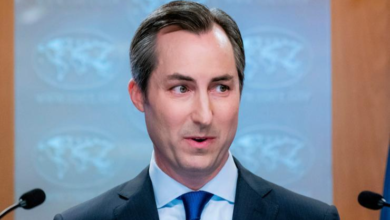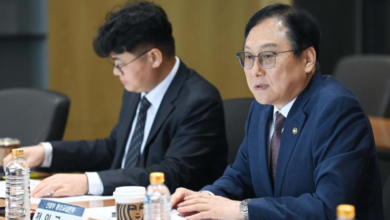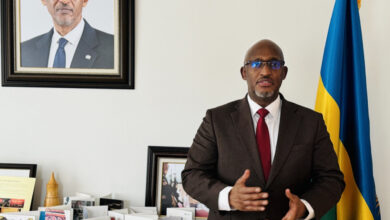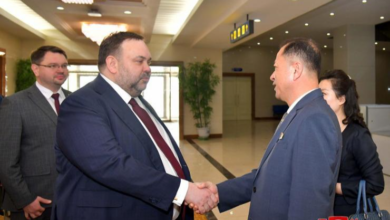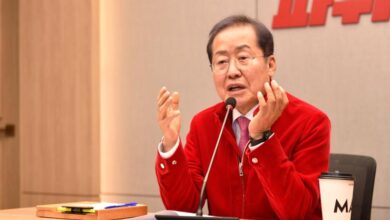https://www.koreatimes.co.kr/www/nation/2024/03/356_371623.html

Lee Kwang-jae, Democratic Party of Korea candidate for Bundang-A constituency in Seongnam, Gyeonggi Province, speaks during an interview with The Korea Times at his election camp in the region, Wednesday. Courtesy of Lee’s camp
With the general elections for the 22nd National Assembly less than two weeks away, the Bundang-A constituency in Seongnam, Gyeonggi Province, is gaining attention as one of the toughest battlegrounds, with two former presidential hopefuls — Lee Kwang-jae of the main opposition Democratic Party of Korea (DPK) and Ahn Cheol-soo of the ruling People Power Party (PPP), staging a neck-and-neck race.
Bundang-A has elected six conservative candidates in eight general elections since 1992. In a by-election last year, the region’s voters elected Ahn with 62.5 percent of the votes.
The region’s conservative swing, however, is now showing signs of change, as recent surveys show that Lee is ahead of Ahn within the margin of error of the surveys.
During an interview with The Korea Times, Wednesday, Lee said he decided to run in the constituency because “the region is a place where all the potentials that can change the nation are enriched.”
“Bundang is not a conservative stronghold, but a region of moderate voters,” the former three-term lawmaker said. “So I believe we have to change the direction of national policy starting from here.”
Lee is one of the seniors among the liberals, serving as a secretary for state affairs monitoring for former President Roh Moo-hyun in 2003. He also served as governor of Gangwon Province and served his three terms in the region.
In the run-up to the current elections, Lee initially was anticipated to run in Seoul’s Jongno District, but he made a challenge to Ahn, even though the party proposed that he run in other regions, where the DPK is leading over the PPP. The Bundang-A constituency is home to the Pangyo area, where a slew of technology, biotech and other firms in advanced industries are located.
“I think Korea may collapse if there is no strong driving force for economic growth,” Lee said. “And I believe the economic growth can be achieved through what I call ‘the Pangyo Renaissance’… While the former presidents led Korea’s status in the era of info-tech innovation, it is time for us to spearhead innovation in artificial intelligence, bio and climate technologies.”
While Ahn is making appeals to voters on the back of his public image — a renowned former software entrepreneur and medical doctor — Lee is highlighting his practicality and abundant political experiences in addressing pending state affairs during his past political career.
“Thankfully, the voters in the region are recognizing my approach,” he said. “In the past, members of the public said to me ‘Thank you for running in the region,’ but now they are telling me that ‘You should work well when you get elected.’”
Recently, Lee and Ahn have both spoken out against the Yoon Suk Yeol government’s strong push to add 2,000 new slots to the admissions quota of medical schools across the country, which triggered a large-scale walkout by trainee doctors.

In this combined photo, Lee Kwang-jae, left, Democratic Party of Korea candidate for the Bundang-A constituency in Seongnam, Gyeonggi Province, and Ahn Cheol-soo, People Power Party candidate for the same constituency, greet citizens, Thursday. Yonhap
Hours before the interview, Lee held a press conference to urge the Yoon government to make a compromise regarding the 2,000 slots to prevent the conflict between the government and doctors from threatening the public’s health.
“The election of course matters, but a prompt compromise (between the government and doctors) is necessary… To enable conversations between the two sides, the first step will be dismissing Second Vice Health Minister Park Min-soo,” Lee said. Park created controversy over his mispronunciation of the word “doctors” in Korean during a press briefing last month that sounded like an expletive.
“Doctors are saying that the government did not persuade them about why 2,000 new slots are necessary and what the scientific reasons are behind that. Doctors began the strike because the expansion plan was announced without any political agreement (with doctors). The first step for exiting the current standoff is a compromise between the two sides, but it should be followed by installing a legal institution for continuity of consultations on the policy.”
Regarding the PPP candidates’ growing calls for the government’s more flexible approach, including that of Ahn earlier this week, Lee said, “It seems to be too late.”
“I regret Ahn’s stance again and again,” Lee said. “Formerly he was a medical doctor, and he should have spoken about this way before the walkout was protracted.”

Lee Kwang-jae, then-chairman of the National Assembly’s Foreign Affairs and Unification Committee, presides over the committee’s plenary meeting at the Assembly in Seoul, Dec.1, 2021. Korea Times photo by Oh Dae-keun
In the previous 21st National Assembly, Lee served as the chairman of the Assembly’s Foreign Affairs and Unification Committee. During his tenure, Lee created headlines by playing a pivotal role in the Assembly’s hosting of Ukrainian President Volodymyr Zelenskyy’s virtual speech in April 2022.
Lee said Korea should systemize its policies on diplomacy to protect the country from diplomatic upheavals in surrounding countries, including the U.S.
“One of the first tasks for the ‘system diplomacy’ is setting up a channel between parliamentary committees on foreign affairs in Korea and the U.S.,” Lee said
“So far, the PPP has been employing diplomatic policies focused on the Joe Biden administration. But now, Donald Trump’s remarks are heralding a difference in the Korea-U.S. relations… To stay intact in such possible changes, we should set up multiple channels to engage with the U.S., with Korea’s each parties keeping diplomatic channels with the Republican Party and the Democratic Party.”
Read the full article here



